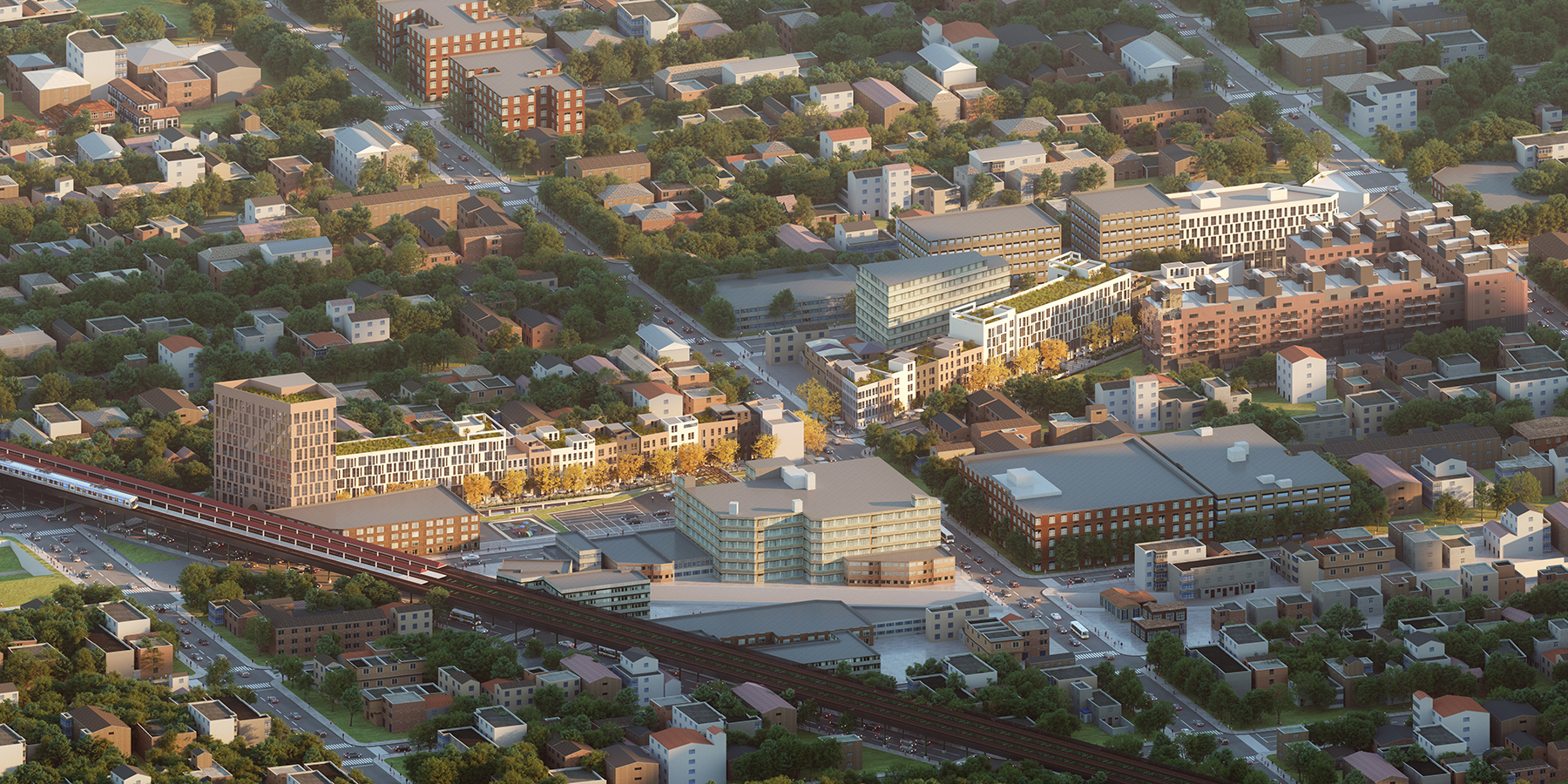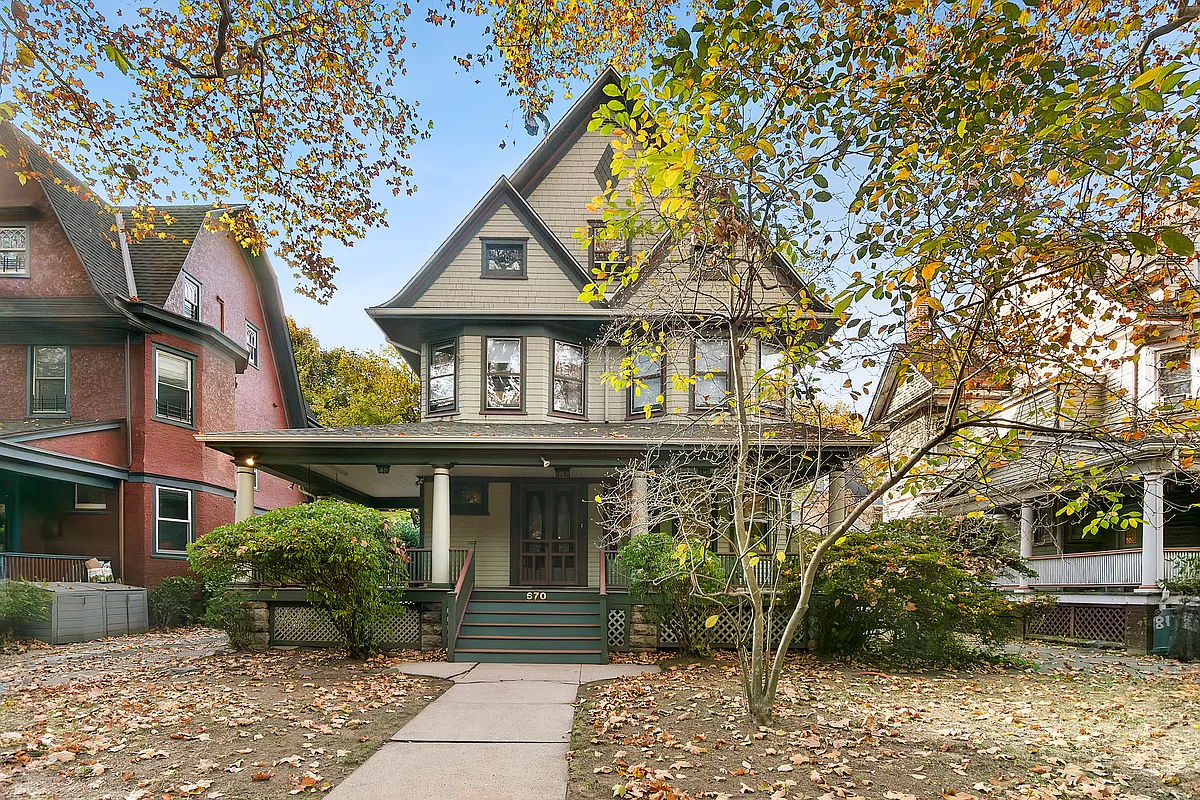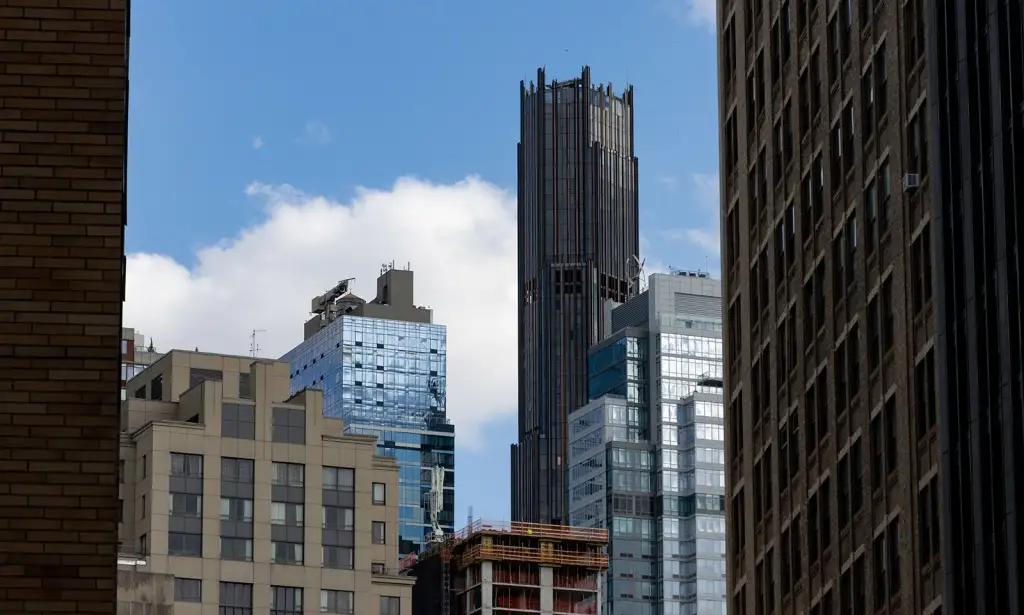John Catsimatidis: Tough Guy For Tough Times
John Catsimatidis: Self-made billionaire; owner of the Gristedes supermarket chain; developer of a planned, 660-unit project on Myrtle Avenue; potential mayoral candidate who says only he is tough enough to carry this city through the tough times ahead. In an interview with Brownstoner at his modest office in Hell’s Kitchen (not the trendy part), he…


John Catsimatidis: Self-made billionaire; owner of the Gristedes supermarket chain; developer of a planned, 660-unit project on Myrtle Avenue; potential mayoral candidate who says only he is tough enough to carry this city through the tough times ahead. In an interview with Brownstoner at his modest office in Hell’s Kitchen (not the trendy part), he describes a bleak future for Brooklyn and beyond. He’s not even positive the first phase of his Myrtle Avenue project is a “slam-dunk” because he hasn’t closed on the loan and “the banks are being a little more onerous than they used to be.” But Catsimatidis says the foundation was poured just in time for the 100 units to fall under the old 421-a rules that give him a tax breaks without providing any affordable units. Families United for Racial and Economic Equality (FUREE) just happens to be planning a protest outside his development site today, furious he reneged on his pledge to build 215 below-market apartments there. The group will also release a report on the displacement of residents and businesses as a result of the Downtown Brooklyn rezoning. Catsimatidis responds to our question about displacement: “There’s no displacement of residents that I know of. There’s no residential buildings that are really being torn down that I know of, and it’s just like I said, people have to stay where they are during a possible recession period.” We’ll find out in the coming months if he plans to officially throw his hat in the ring. Click through to read the interview, edited for length.
Brownstoner: You’ve eliminated the affordable housing component for your Myrtle Avenue project, which is [planned at] 660 units total. What do you think that means for other projects that would be seeking bonds?
It’s not true that we eliminated it forever. The first building we’re building, there’s not an affordable component. They didn’t have any municipal bonds to give us. For the affordable deal, they promised in the future that they think they’ll have some bonds available in 2009. So as we’re building, if we’re building, depending on the sanity of the real estate market in 2009, and if there are bonds available, and the bond market is open to buy these bonds, then we will consider building some affordable units in those buildings.
Looking forward today, the insanity going on in the mortgage market and what’s going on with Fannie Mae and Freddie Mac, they’re sold off 50 percent — I’m not terribly optimistic that the real estate market will come back next year. The building that we are building now, we wanted to continue to do something so it’s not just a vacant lot, and to provide essential services for the neighborhood like the Duane Reade that we’re contracted for. And the supermarket may be one of ours, it may not be one of ours. And one of the banks that were dealing with has agreed to provide a construction loan, which we haven’t closed on yet. But we did get the foundation in on time to meet the June 30 deadline for the 421-a tax abatement (under the old 421-a rules, developers could receive tax abatements without including affordable housing in their projects, unless they were building in certain Manhattan neighborhoods. As of June 30, the area where affordable housing is required has been greatly expanded, and includes Downtown Brooklyn).
Vince Tabone, Red Apple Group senior counsel: This project would not be viable but for the old 421-a. As it is, it’s only because of his economic wherewithal — he’s fronting the financing for the first phase while we’re negotiating with the bank so that we could have made that deadline.
You said you haven’t closed on the construction loan. Does that mean it’s not certain you’re going to move forward?
We’ve negotiated, and the banks are being a little more onerous than they used to be, but we feel it’s probably going to close. But it’s not a slam-dunk.
How much money in bond financing were you seeking per unit?
Lets call it 100 just to multiply it easily. 100 units, $25 million, it’s $250,000 per unit (total, or $1.25 million in bond financing per affordable unit that would have been created).
How do you think that the construction of all this new luxury or market-rate housing in Downtown Brooklyn impacts the lower- and middle-income residents?
First of all, market rate has a dual meaning. It is market rate as far as something you’re buying in Brooklyn. But it’s half price from Manhattan. So, I would almost consider it affordable- to middle-class housing at that market-rate. Even if we decided to sell them as condos, you’d be selling them at $600 [per square foot], $700 bucks maybe, versus Manhattan, which is anywhere from $1,200 to $1,500 a square foot. So, I would almost put it in the category of affordable, middle-class housing.
To people in Manhattan. But it’s not affordable to a lot of the people who are living in that neighborhood right now. Would you agree?
Then we might as well build nothing because we couldn’t build nothing. For whom do the bells toll? Think about it. I mean, should the taxpayers dish out money for affordable housing? Okay they’re willing to, but they ran out of the bonds.
So, you’re saying that without the subsidies housing can’t be built that is affordable to people living [in that neighborhood right now].
But then they’re already living there. If you want to bring in more people at those rates, then probably not. Where would you bring them in from, if they already have homes?
What about wages then? What could be done at the other end so more people could afford these houses?
Well, as of right now that’s not my department as far as wages … I worked at the Chamber of Commerce for 12 years at the West Side of Manhattan when the West Side of Manhattan was going through a revitalization. And the one thing I learned was, if business is doing well, people in the community are doing well. And if you want to kill businesses then people are not going to do well either, because there are not going to be the jobs.
Do you think prices are dropping because people have to put a higher percent down on their mortgage or because people are losing their jobs?
It’s a combination of both. I think a year ago, if we’re selling condominiums for $600,000, you go to the bank and borrow $550,000 and everybody would say, Okay, I’ll put $50,000 down on a down payment, my condo will be worth $800,000 a year from now,” and everybody has a good time. Now the banks are requiring the old-fashioned mortgages and not everybody has $120,000 to $140,000 for a down payment, so that’s one factor.
The other factor is, there’s a fear coming across Wall Street with the financial institutions, with the banks, Wachovia, all the investment bankers. There’s no deals being done. When there’s no deals being done, the next thing that happens after no deals is layoffs. That shoe has not dropped yet but the people working for these firms know that that shoe is about to drop because … that financial market is not going to turn around in 60 days.
So, is there a solution on the city level that can help ease us through this transition?
What’s going to happen is, people are going to [batten] down the hatches. And if you’re living in a rent-stabilized, rent-controlled apartment, you’re not necessarily going to decide to move to a larger apartment that might be market-rate right now.
For a while there was a lot of movement, and theoretically there will be more in the future. As the city continues to redevelop itself, do you think there’s something the city could be doing better to reduce the displacement of residents [and businesses] as it reshapes itself? Brooklyn in particular we’ll talk about.
There’s no displacement of residents that I know of [Downtown]. There’s no residential buildings that are really being torn down that I know of, and it’s just like I said, people have to stay where they are during a possible recession period
… When I grew up on 135th Street, my father was paying $48 a month rent. My father was a waiter and a bus boy. He wasn’t about to move into a $1,000 a month apartment just because he didn’t like living on 135th Street. I don’t know of any apartment buildings of great degree — maybe one, two, three, a small degree — that were torn down. And sometimes those people are paid large monies to displace themselves … But we’ve never torn down residential buildings.
… I went to Brooklyn Tech High School. I remember Dekalb Avenue, I remember Fort Greene Park was a combat zone. We never walked alone on those streets, we always had at least six guys with us. So, I remember those neighborhoods. I remember Myrtle Avenue when I first bought it 25 years ago.
Why did you buy it 25 years ago if it was a war zone?
It was a war zone. Because Long Island University was selling it. I looked at is as an opportunity to buy three city blocks for $400,000 or $500,000.
Now there’s a lot of new construction underway in Brooklyn, and of course across the city but again we’ll stick to Brooklyn. And the economy right now — the lending practices are tighter, the economy is beginning to sour. Do you think there are certain neighborhoods in danger of having a lot of uninhabited apartments, or half-built projects, or vacant lots where there was supposed to be something built, like in so many other cities across the country?
In Buffalo, I understand there’s 20,000 vacant homes.
Right. So, do you think that’s going to happen to places in Brooklyn?
Like I said, New York City is the greatest city in the world. And I think there’s a possibly of prices coming down to meet the needs of the people. And when the banks stop lending and I want to sell a house, there’s such a thing as seller financing. When the seller owns his house he can take a small down payment from the buyer and give him back a purchase-money mortgage (a loan provided by the seller as opposed to a bank, often given when the buyer is unqualified for a commercial mortgage).
And then in terms of jobs that would fill those buildings with people?
If you have less construction — and I think it was a terrible time for the city to have 421 go away — because if you have less construction, all those people who have been working construction jobs because the city’s been booming the last two, three years, you’re going to have a lot less work around.
Well, do you think that those construction workers are the people who are going to be filling these new apartments in Brooklyn?
Not necessarily.
When do you plan to formally announce you’re going to run for mayor, if you’re going to run for mayor?
We’re certainly looking at it very carefully and we’re thinking of forming an exploratory committee over the next month or two.
Did you change your party affiliation from Democrat to Republican already?
Yes.
And why did you do that?
Because I’m a moderate businessman. I believe business has to do well for people to do well. And a moderate businessman, the Democratic Party hasn’t nominated a moderate businessman in over 100 years … And I think when things are tough, you need somebody tough to manage the city.
What makes you tough?
40 years of surviving in business.









Kishke anyone?
I think I’m going to gag… Polemicist Pompous Asshat. Excuse me sir, you have Grey Poupon dripping off your lip. Or is it John Catsimatidis after birth?
The What: Tough Guy For Tough Times
Someday this war is gonna end…
While I do enjoy rousing the rabble a bit, I do want to stay someone on focus.
cmu:
Within the context of New York City, affordable housing refers to housing that is constructed with government subsidized bonds and/or grants in exchange for the units being rented to people who have a household income within a specific range.
Habitat for Humanity is a different story, but it’s impact on the market is really irrelevant. It’s a nice, feel-good concept but it is untenable. People who work for free never make a significant contribution to any economy unless they are already wealthy.
If you read my posts more frequently, you would find it quite clear that I believe people should be allowed to develop, with minimal restrictions, any kind of housing they wish on their property. It has been proven time and again that the housing shortage in New York City is directly related to the city’s zoning laws (which actually create something akin to the gated communities you abhor) and the likely expansion of rent stabilization, which results in developers not wanting to undertake the risk of building rental property. In which cities is housing in short supply? New York and San Francisco, the two cities that practice rent control and severely restrict building density.
As for your definition of civilization, you clearly haven’t read any of the great pioneering works on the subject like Edward Gibbons’ Decline and Fall of the Roman Empire and Oswald Spengler’s Decline of the West. Your beliefs are shared by most of the third world – places that live in societies far less prosperous than the average city in the Roman Empire 2,000 years ago. Think about that, and perhaps even read the books I mentioned.
I’m impressed by the Whats research skills.
Bxgrl this is it!
Godwin’s law
http://en.wikipedia.org/wiki/Godwin's_law
Godwin’s Law (also known as Godwin’s Rule of Nazi Analogies)[1] is an adage formulated by Mike Godwin in 1990. The law states:[2][3]
“As a Usenet discussion grows longer, the probability of a comparison involving Nazis or Hitler approaches one.”
This is a shield so Asshats can hide behind to spew their racism!
For example, there is a tradition in many newsgroups and other Internet discussion forums that once such a comparison is made, the thread is finished and whoever mentioned the Nazis has automatically “lost” whatever debate was in progress.
Notice one thing.. No Asshat attacks on The What!!!
The What
Someday this war is gonna end…
I have to say this.. I miss the Anons! Since Brownnstoner implemented the log on thing, the quality of this Blog went down the drain. Now we have to put with Developer Blow jobs, Cheerleading Asshats, Fart Smelling Dumbasses and Covert Race/Class agents.
There is no way Brownstoner could post this garbage with Anons logging in. There would’ve put this place on blast! How many hand jobs is up on deck Brownie? only time will tell…
“too afraid to take on the what or were you too dense to get his german reference?”
bxgrl, Polemicist is a punk! He knows better!
What is so discussing that people is even considering this Asshat for Mayor? About 12 years ago there was fires around his supermarket. They was the work of Asonist because BIG RED (Numbers Newspaper for the Hood) was there. Hey Sarah ow about doing some “Reporting” on that instead of giving him “front and back”!
The What (Let”s see if this gets censored)
Someday this war is gonna end..
Gristedes used to be an upscale market, back in the day. Back before JC bought it. He started by owning a Red Apple supermarket, and used his profits from that to leverage into other businesses. He’s done well, but when he bought Gristedes he ran it into the ground.
dittoburg, please see what@10:45. although I wouldn’t quite say he lost that argument. (where did you hear this fairly well accepted rule?).
As far as whether or not I can enlighten or convince anyone of anything I think you need to read this thread thoroughly. If anyone was hoist by his own petard, it is polemicist. and I question why it’s ok to be an out and out racist, as he is, but to equate his ideas with nazism- and believe me there are some real parallels- suddenly means the first person to say it loses the argument. Judging by the posts, polemicist was well answered and out of his league.
bxgrl – its a fairly well accepted rule that the first person to reference Nazis or Hitler in a debate not related to WWII has lost the argument. Stick with your reasoned points if you want to enlighten/convince people.